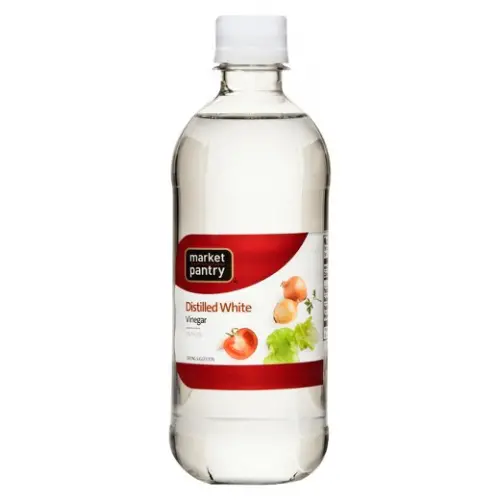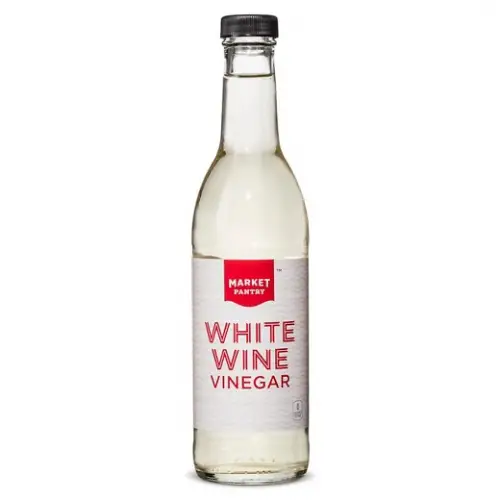If a recipe calls for white wine vinegar, can you use white vinegar as a substitute? This question has been asked so many times on the internet, but many of us still do not know the answer. In this article, we will learn the difference between the two types of vinegar and if they are indeed interchangeable.
Summary Table
| White Vinegar | White Wine Vinegar |
| Made from distilled grain (e.g. corn) and water | Made from white wine such as pinot gris or champagne (quality white wine vinegar is produced by using premium grapes, aged in wooden barrels for up to two years) |
| Has a higher level of acidity (5% to 8%) | Has an acidity level of about 5% |
| Has a harsh sour taste | Has a complex, mellow fruity taste |
| Also used as a natural household cleaner and disinfectant | Mainly used for culinary purposes |
Descriptions

White vinegar, also called “distilled white vinegar” or “spirit vinegar” in the United Kingdom, is a colorless vinegar made from distilling ripe grain (e.g. corn) and water. It is the most common type of vinegar used across the United States.
With an acidity level of about 5% to 8%, the sourness of white vinegar can be overpowering in recipes that have delicate flavors. However, it is commonly used for salads, marinades, meat preservation, vegetable pickling, baking, and other cooking recipes. In many countries, it is also used as a condiment.
White vinegar has the ability to remove mineral build-up on smooth surfaces (e.g. glass) which is why it is also extensively used as a natural household cleaner and disinfectant.

White wine vinegar is a type of vinegar made from white wine such as pinot gris and champagne. Quality white wine vinegar is produced by using premium grapes tand is aged in wooden barrels for up to two years to develop a rich flavor.
With an acidity level of 5%, white wine vinegar has a complex but mellow taste with a hint of a fruity flavor. It is great for savory dishes, salads, and many cooking recipes. It can also be used to infuse other types of vinegars with spices, fruits, and herbs.
White wine vinegar is extensively used in Cyprus, Israel, and other countries in the southern and central regions of Europe.
White Vinegar vs White Wine Vinegar
What, then, is the difference between white vinegar and white wine vinegar?
One of the differences between the two types of vinegar is that white vinegar is made from distilled grain (e.g. corn) and water, whereas white wine vinegar is made from white wine such as pinot gris and champagne.
In general, white vinegar has a higher level of acidity (5% to 8%) than white wine vinegar (about 5%). White vinegar has a harsh sour taste, while white wine vinegar has a mellow fruity taste.
Additionally, white vinegar is also used as a natural household cleaner and disinfectant, whereas white wine vinegar is not.
It may not seem as if there’s a huge difference between the acidic levels between white wine vinegar and white vinegar. However, consider that the higher the acidic level in vinegar, the better the cleaning that vinegar will do. That’s why white vinegar so popular as a cleaning product.
There’s a big difference in the smell of white vinegar compared to white wine vinegar. White vinegar is said to have a stronger, more sour smell, while white wine vinegar smells more like fruit. The wine causes a fruity smell in the white wine vinegar it’s made from.
You may also notice a difference between the appearance of white wine vinegar and white vinegar. White wine vinegar is not clear—it has a more off-white color, and it can sometimes look cloudy.
On the other hand, white vinegar is clear.
You may also notice a difference in the price between these two vinegars. White vinegar is usually cheaper, while white vinegar tends to cost more.
Both white wine vinegar and white vinegar are used in cooking; however, they have different uses in recipes. White vinegar can be used for the following:
- Baking
- Cooking rice
- Pickling
- Poaching eggs
- Marinades & dressings
On the other hand, white wine vinegar, with its milder flavor, can be used for:
- Salad dressings
- Fish recipes
- Mayonnaise
- Italian cuisine
- Potato salads
- And more
Can You Substitute White Vinegar for White Wine Vinegar in Recipes?
Yes, in a few cases; however, we don’t recommend regularly substituting white vinegar for white wine vinegar. For one thing, white vinegar is more acidic and works differently in recipes. In addition, this vinegar has a more sour flavor that may not work well in some dishes.
One of the best substitutes for white wine vinegar is white wine. You can also use rice vinegar, apple cider vinegar, champagne vinegar, or sherry vinegar instead of white wine vinegar.






